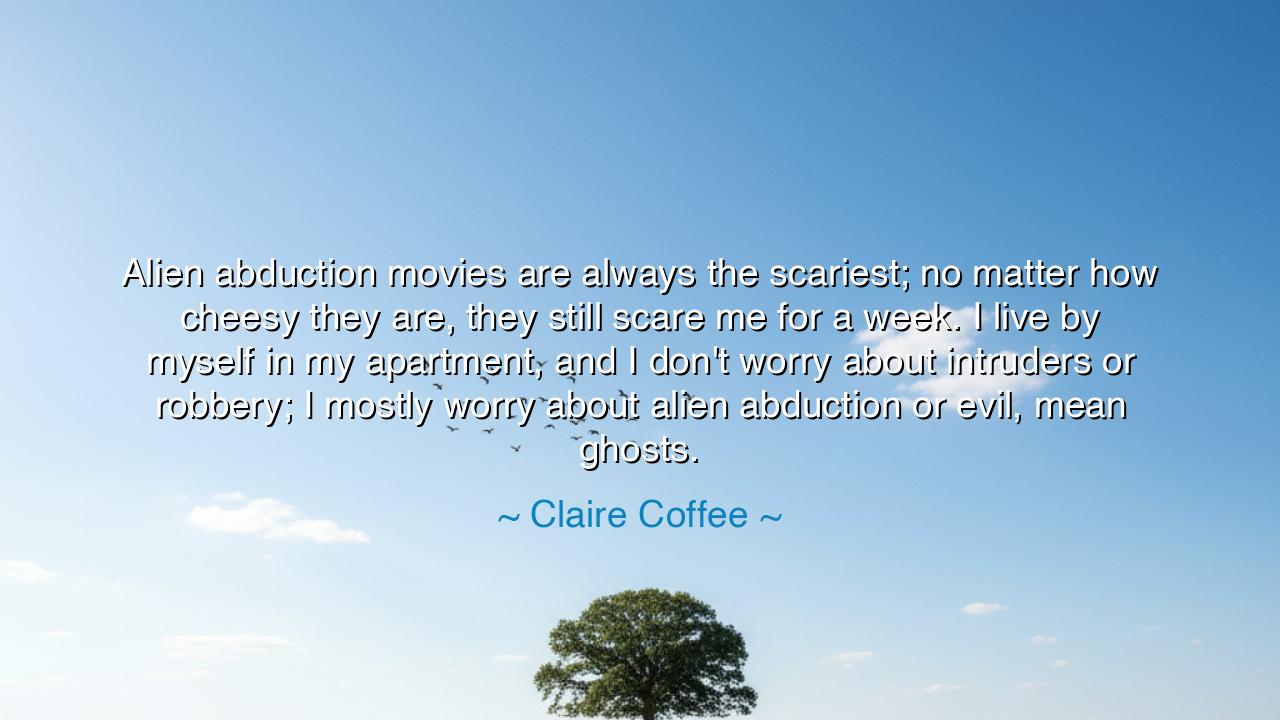
Alien abduction movies are always the scariest; no matter how
Alien abduction movies are always the scariest; no matter how cheesy they are, they still scare me for a week. I live by myself in my apartment, and I don't worry about intruders or robbery; I mostly worry about alien abduction or evil, mean ghosts.






Gather round, children, and listen to the words of Claire Coffee, who speaks of the deep fears that dwell in the hearts of all humans, no matter how brave or wise they may be. "Alien abduction movies are always the scariest; no matter how cheesy they are, they still scare me for a week. I live by myself in my apartment, and I don't worry about intruders or robbery; I mostly worry about alien abduction or evil, mean ghosts." In these words, we hear a truth that transcends the realm of science fiction. Fear, that ancient and primal force, is often not shaped by what is real, but by what lies just beyond our understanding—the unknown, the unseen, and the unexplained.
Since the beginning of time, mankind has been haunted by the things they cannot comprehend. In the earliest days of civilization, people turned their gaze to the heavens and saw gods and monsters, interpreting the stars and the dark spaces between them as realms where the unknown lurked. The ancient Greeks, for example, believed in gods who could both protect and destroy, and they told stories of creatures that came from the deep, dark corners of the earth. Zeus, the king of the gods, could send forth storms, and the mysterious Erebos, the god of darkness, held dominion over the unknown depths. These stories, though of a different time, still speak to our deepest fears—those of the things beyond our control, things we cannot see but know are there, waiting to cross the threshold of our understanding.
The fear that Claire Coffee describes—of being alone, vulnerable in her apartment, and haunted by thoughts of alien abductions or malevolent ghosts—is not a fear of material loss. No, it is the fear of being caught in a world that has no rules, no boundaries, a world where we are helpless before forces we do not understand. This is a fear that drives much of human thought and action—the unknown. Think of the ancient sailors who sailed into the vast oceans; they feared the creatures that lived below, but more than that, they feared the darkness of the ocean itself, the vast, uncharted territory that seemed to have no end. Fear of the unknown is the oldest of fears, and it is as present today as it was for those ancient voyagers.
In the same way, alien abduction stories have captured our imaginations because they tap into that primal fear of being taken from the familiar, from the world we know, and cast into something strange, alien, and beyond our comprehension. Evil ghosts, too, carry the same weight—the fear that something unseen and malevolent might reach into our world, just as the ancient demons were believed to do, pulling us into their dark, unforgiving realm. In both cases, it is not the physical harm that we fear most, but the loss of control, the invasion of something we cannot understand, something outside of our influence.
Consider the story of Orpheus, the great poet and musician of Greek mythology, who descended into the Underworld to retrieve his beloved Eurydice. In the land of the dead, Orpheus encountered Hades, the god of the Underworld, and saw the very darkness that separated life from death. His journey was not just a physical one, but a mental one—a struggle to face the unknown and to overcome the forces that lurked in the shadows of his world. Orpheus' fear of the dark forces of the Underworld is mirrored in our own fear of the things that lie beyond our understanding, the things that seem to move in the corners of our minds when we are alone at night.
In this, children, we see that fear—whether it is of alien abductions, ghosts, or darkness—is not simply a reaction to the external world, but a reflection of our internal struggles with the unknown. It is a reminder that no matter how much we learn, no matter how much we understand, there will always be forces that elude our comprehension. And it is in our response to these fears that we grow. Courage is not the absence of fear, but the ability to face what we do not understand, to stand firm in the face of the unknown, and to continue forward.
So, children, when you are faced with the darkness—whether in your own mind or in the world around you—remember this: fear is not something to be defeated, but something to be understood. Like the ancient sailors and Orpheus, you must learn to face the unknown with courage and resolve, knowing that in the very act of confronting it, you will gain wisdom and strength. The unknown may always be with us, but it does not need to control us. Instead, let it be a reminder that we are alive, that we are learning, and that in every dark corner of the world, there is the possibility of light.






AAdministratorAdministrator
Welcome, honored guests. Please leave a comment, we will respond soon